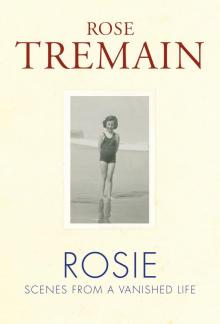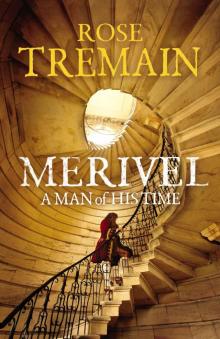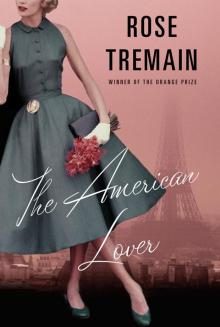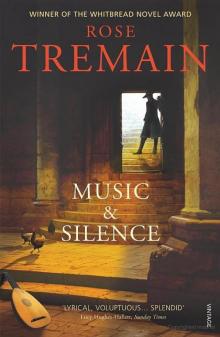- Home
- Rose Tremain
The Cupboard Page 5
The Cupboard Read online
Page 5
‘Sure they do,’ said Ralph. ‘She didn’t have to see me.’
‘American, you is?’
‘Yup.’
‘Cocky lot, the Yanks. Fink they own the bleedin’ world. Worse ’n the Ruskies, my Billy sez you are. Global mad.’
Ralph chose to smile. Through his grin he said: ‘Miss March has asked for some tea. D’you want to make it, or shall I?’
‘Tea?’
‘Yup.’
‘She don’t normally ’ave tea.’
‘Well. She wants some today, she’s feeling –’
‘You don’t need to tell me wot she’s feeling. There’s not a thing about that old lady I don’t know. And what would she do if it wasn’t for me? She be put in an old people’s dying dump.’
‘You’ll get the tea, then?’
Mrs Burford stood up and wrung out her floor cloth. Her arms, up to the elbows, were red with the hot water.
‘Tirin’ ’er out, I wouldn’t wonder, with all your American chat.’
‘Jesus …’ Ralph began, but he didn’t go on. He walked slowly back into the sitting-room where, with the lamp turned on, he found Erica sound asleep. She snored like an old witch, loudly and angrily.
That evening, Ralph started to read The Hospital Ship. He had read it twice before.
As he opened it and glanced along the familiar first line, he thought, she hasn’t told me yet how she began to write – and why. Then he forgot her as the story began to unfold:
‘When the evacuation came, there were one hundred and five who boarded the ship. The ship had arrived in the night, flying a flag no one recognized, and at dawn, when they noticed it, the one hundred and five lying huddled in the bay began to wail and point.
General Almarlyes started to crawl around with his tattered bottom in the air, searching in the grey sand where the merchant crabs had their holes, for his lost fieldglasses. The merchant crabs bit his ankles and ran over his hands, but the fieldglasses were lost and General Almarlyes began to weep for the hundred and fifth time since he had lost not only his fieldglasses, but the war.
The sea was calm. The dawn that morning was kind, and nothing moved, only the merchant crabs and General Almarlyes’ ragged arse. And the wailing that went out to the ship could have been song, because it carried hope on that morning of extraordinary stillness, the last hope of the hundred and four and General Almarlyes who were all that remained after the earthquake had come and gone. Above the bay, in the gentle, yellow light, there was no sign of the birds who had circled there for days, waiting patient as death, for their first feast. Eyes stared up, fancying they saw them as usual, eyes blinking. Staring into the sunrise and then voices marvelling in whispers: “the sky is clean!”
Slowly, she clambered down from the ship and came wading in. General Almarlyes sat down on the sand and watched her. He wiped his eyes on his sleeve, blew his nose on his shirttail. He let go an expletive, one pent up in him for days, to reassure himself that he still had a voice and was a man.
Her gown was sacking. She held it in a bundle round her so that only her feet and strong legs were wetted by the green water. She was as old as the ship. A piece of fine canvas, the colour of the ship’s sail, was wound round her head and blackly on it, where it wrapped her forehead, was burned the only message she had for the hundred and five: “I am a Daughter of the Lamb.”
Where the water slapped the beach, she let her skirts drop. General Almarlyes scratched himself and looked about to see if the hundred and four were afraid. Many of them were retreating slowly, limb by limb, leaving the wounded behind, creeping backwards away from her to where the undergrowth began. They were no longer wailing. Hope had died in them as quickly as it had arrived and fear had returned. So General Almarlyes struggled to his feet. Through one of the rents in his uniform, his sex, grey with sand, gaped vulnerably. It swung, almost imperceptibly, as he spoke now with all that was left of a voice that had once roused a continent to war:
“Bourton-on-the-Water!” he shouted. “Ashton-under-Lyme! And never, never forget it, as you cowards retreat, Stoke-upon-Trent!”
No one laughed. The hundred and four were motionless, transfixed by the words of the madness of General Almarlyes in that motionless morning. So he held wide his arms and walked, as boldly as he could, to the water’s edge, and very slowly they followed him. Many could not walk, not as General Almarlyes could walk. Many had to be carried or helped along. Yet they all followed. And now there was a line of them moving slowly, slowly towards the ship. For half an hour the birds returned and hovered no more than thirty feet above the line. But by midday the ship had swallowed the line and pulled in its barnacled anchor and the bay was deserted. The merchant crabs reclaimed the beach and began to burrow in new places.’
Ralph’s reading was interrupted by a knock at his door. A polite uniformed boy, the uniform too large for his slight frame, held out a letter and an apologetic smile.
‘I’m so sorry, sir. This letter came for you this morning and was put in 261’s pigeon-hole by mistake. Reception asked me to bring it up to you.’
Ralph smiled and took the letter, fumbled automatically for some cash in his trouser pocket and then remembered he was wearing pyjamas.
‘Hold on,’ he said to the boy. The boy waited. Fifteen, sixteen … Ralph pondered the boy’s age as he searched for money … and learning the terrible sleepless hotel trade from the bottom up, all other education forgotten … Ralph found thirty pence and had handed it to the boy before he had worked out the relative fairness of the tip in dollars and cents. Then the boy was gone and he was alone with his letter.
Ralph had been moved, as he always was, by the appalling General Almarlyes with his flagging sex and his failing sanity. General Almarlyes was one of his favourite characters in fiction, utterly corrupt, worthy undoubtedly of his extraordinary end, yet redeemed for the reader by his constant search for dignity and by his dreams of being some other man, a man with a thick head of hair and a virgin heart. He began to wonder whether he might come to know one day soon where Erica March had ‘found’ General Almarlyes.
The letter was postmarked Oxford. Noticing this, Ralph regretted the thirty pence he had given the boy: it seemed miserly. Only one person ever wrote to him from Oxford, with anecdotes about his contented, protected life and offers of rooms if Ralph should ever find himself in England – John Pennington.
John Pennington had done an M.A. in Modern American Literature during Ralph’s last year at U.C.L.A. Whenever Ralph thought about that Californian summer – which he seldom did, because his parents belonged to L.A. now and he vowed he’d never go back there – he thought inevitably about John Pennington.
Before leaving New York, Ralph had written to John, really his only friend in England, telling him about his assignment, asking him for some time and giving the address of his hotel. No answer had arrived and the notion that John couldn’t be bothered to see him had contributed – unspoken – to Ralph’s feelings of dereliction.
The letter was short, characteristic of John’s muted style, and in many ways disappointing. But at least it was there:
Worcester College,
Oxford
Sunday evening.
‘Dear Ralph,
How nice to get your long letter and to know that you are planning another trip. Indeed of course you are here by now, I see from the date, and I must apologize for not replying before you left.
The reason is I am terribly busy, although that isn’t the right word – “distracted” I think is more appropriate – writing a book. I believe I mentioned to you in my last letter that I felt dredged by my work on the Metaphysical Poets and I think I must leave them now. I truly thought I would do something on Blake next, but his extraordinary fires don’t seem to kindle mine, not enough, so I have turned layman and am dementedly writing a novel! Heaven knows if I can succeed.
Yes, you are right I’m sure: Erica March is an important novelist, and has been neglected because she’s been sil
ent for so long. The Hospital Ship made her famous but my favourite is In the Blind Man’s City. Good luck with her. She may be too old to say anything important or interesting now.
We must arrange at least an evening before you go back. Would you be free to come and see me here? It’s not that I’m afraid of the rail fare but I’ve promised myself I shall work a little on the novel every day and London would be a ghastly interruption. Don’t I sound mean? But I know you’ll understand and will journey here to see me, if you can. I can arrange a room.
Yours affectionately,
John’
Ralph read the letter twice, imagining John in a cold room that he had never seen, listening to clocks chime and afternoons pass, writing on and on in his ordered hand, neatly crossing out, rephrasing, leaving off only to eat or sleep, a total absorption. And with this image of John he contrasted his own monkeyish swings and leaps to and from fear: hand never steady unless with the Marlboro pack, sleep becoming elusive, uncanny longing to possess a firearm … only with Erica, in her actual presence, Ralph thought, is my mind still.
Ralph got back into bed and picked up The Hospital Ship again. He decided to use John Pennington’s letter as a bookmark in it, so that he wouldn’t lose the letter, and would remember to telephone John as soon as he felt he had made some real progress and could leave London for a day or two. He read until sleep began to touch him. He read how the fifty Daughters of the Lamb came out like ghosts from the depths of the ship and stood with their arms round the hundred and five, whispering to them that the Lamb had sent a wind and the wind had blown the mercy ship to the island and now they would begin the long voyage home. Home to where? some of the limbless and sightless asked. Home to where? But the Daughters of the Lamb couldn’t – wouldn’t – say, because each of the hundred and five, including General Almarlyes, would travel at his own pace and some would find home before others and some might never find it. And it was then that General Almarlyes noticed his exposed grey penis for the first time since he had sighted the ship and in a very humble voice that no one recognized, asked for it to be covered up.
‘I’m so sorry, Ralph,’ said Erica, as he went in, ‘I was going to tell you so much yesterday and then I just went to sleep. It was dark when I woke up and you’d gone.’
‘That’s okay,’ said Ralph.
The wine was in its place. A black turban with an amethyst brooch stuck into it had replaced the red one. Erica was feeling strong.
‘Now, about Chadwick,’ she said, ‘he never heard from Athelstone again and this was all to the good of course because had he sent postcards, or anything like that, Chadwick’s heartbreak would have been unfairly prolonged and as it was he did try, after a fortnight or so of weeping and prostration, to get about again on his poor legs and I could have written to my father and told him I would soon be home, but by then it was too late. For I followed Emily, after that. Not to her death but all the way up to her death and past it. And I don’t know to this day what bound me to the movement so utterly. I believe it was the kind of movement to which you were either bound utterly or not at all.
‘In Suffolk, on the farm, I hadn’t thought much about what Chadwick continued to call the Woman Question. I suppose I didn’t even know about the terrible unfair wages and the divorce laws and all the limitations imposed on women so that they were banned from following almost all the professions and had to be content with what they had – and what they had was pitifully little, not even the right to own property if they were married and of course not even the right to vote! But I couldn’t see all this, not before I came to London. My world had been so tiny, the world of the rogation and the harvest. I was, as Chadwick said to the Pethick Lawrences, a child of ignorance.
‘Emily Davison changed me.
‘“The time is now, Erica!” she said, “the struggle is now and if it is not joined now then the movement will be lost and we shall have failed. Let history not write of us that we failed!” Oh she said the most extraordinary things! I felt her words going into my body. They poured into me and I shook. Her favourite motto was “Rebellion against tyrants is obedience to God” and I have often thought of it through my life and let it lead me on, except that I soon had to substitute “humanity” for “God” because I lost my belief in Emily’s God, long ago. Or perhaps I never really had it.
‘It was June and Emily had been in Holloway since February. During those months she had tried to die twice by throwing herself over the prison balcony and then down some iron stairs, yet she was such an odd companion for death, so touchingly alive. And she hardly spoke of her suffering. She only told me how each one of us who joined the struggle would be “set apart” (apart from what I had no idea but being “set apart” sounded wonderful, wonderful and I remembered my father’s cows, Primrose and Clover, and I thought, never again will they kick me or shit onto my boots because now I am “set apart”). Little did I know that in two years I’d be back with the cows and Emily would be dead and all the world at war and the women’s vote forgotten.
‘I had to prove to Emily that I dared to be “set apart.” I read that night in the paper she gave me, the Suffragette, that “members of the W.S.P.U. are showing a heroism unsurpassed at any time in the world’s history” and I determined to join in and defy fortune and face death and so I went to Chadwick and asked him to give me the subscription money for the W.S.P.U., which naturally he did. Yet I was afraid to do anything without Emily. I was afraid to go down to Lincoln’s Inn and actually join up. The issues were wide, you see; I didn’t really understand about Conciliation Bills or Cat and Mouse Acts – not then, I was rather like an ignorant soldier who leaves his family to go to war and yet he barely knows what he’s fighting for. There were many of these, weren’t there, in 1914, who joined up with patriotic ecstasy, without ever knowing why, and I was one of them in 1912. All I had was Emily and her words. I suppose she understood this– my terrible ignorance – because she came back a few days later and together we went to Lincoln’s Inn where I met Mrs Pankhurst for the first time. The morning I left to go to Lincoln’s Inn Chadwick wrote to my father. He said work had been found for me, part time in a reputable tea-shop in Bond Street.
‘It was a very beautiful day, I remember, and Emily and I were both dressed in brown which was an odd coincidence and I kept thinking, I wish she was my sister. Why haven’t I got a wonderful elder sister like Emily? And on the bus I told her about my mother’s death and she put her arm through mine.
‘It was my first love affair. Never expressed, of course, nothing sexual. I expressed it in what I did for the movement, in the fires I lit and in my shouting. I don’t even know if Emily was aware of it – aware that what I did, I did not for the thousands in the sweat shop, but for her, and then afterwards for her memory. It wasn’t difficult to suffer, not once I had begun. I was twenty – almost twenty – and very strong. Even the hunger striking, when we did this in protest at our treatment in Holloway and then again at Strangeways, I could endure it and not be weakened, not very much. Only my dreams, I remember, were extraordinary during the hunger strikes: they were very powerfully sexual and I was ashamed of them and wanted to cry, and I think these dreams weakened me a little.
‘We were forcibly fed of course and this was disgusting – an outrage. They’d come in, wardresses and doctors, and the doctors would force terrible steel things into our mouths to hold them open and these steel things tore the gums and bruised our lips and were a terrible invention like all weapons of torture. And then they’d pour some kind of gruel down our throats, the sort of awful stuff Oliver Twist asked for more of and the choking feeling of this gruel going down into your stomach was one of the worst things I can remember. It was impossible to endure it and I always vomited it up over my prison clothes. I dreaded the forced feeding. Strong as I was, I dreaded this and I don’t think there were any of us who didn’t dread it because I often heard the screams of the others and the retching.
‘Asquith was our enemy. I’d n
ever even seen him, but I imagined him, in his wing collar. He was a cunning and clever man. He understood injustice but he balanced injustice against expediency and expediency always won. He was no worse, I suppose, than the politicians of any era, but to us he was the Devil.
‘We wanted to truss him up and roast him, and really when you think of it hundreds of politicians should have been trussed up and roasted and instead we’ve made statues of them in bronze. Power corrupts – always and inevitably. Power within the movement corrupted Mrs Pankhurst, in a way. She was brave, my word, but she wanted all the glory for herself and Christabel. She distrusted even the Pethick Lawrences and threw them out of W.S.P.U. despite all that they’d done and in time she came to distrust Emily. She feared martrys because they steal the limelight, and she knew that Emily was in love with death.
‘My poor dear Emily! If I believed in God – which I don’t at all, Ralph – I suppose I’d be thinking, soon I shall see you, Emily, just as you were that day in Chadwick’s rooms, with your smile and your green dress. I’d imagine us going for a walk arm in arm and I could tell her, couldn’t I, what they were like – all the years I’ve lived since then? What rubbish, eh! She’s dust under Morpeth.’
Erica straightened her turban and leant back. Ralph now recognized in these little movements her way of saying I’ve had enough for now, I can’t say any more, so he switched off his recorder and leant forward to pour her a glass of wine. Then he felt her hand touch his shoulder and he looked up. She had bent down and was looking at him intently.
‘I tried to mention something to you the other day, Ralph. But I wasn’t strong enough that day. It’s only a little thing, a kind of superstition, and I want to ask you a favour.’
‘Please do,’ said Ralph.
‘I don’t know,’ said Erica, ‘if you’ll be the one to carry it out, but I think you may be. I’ve been waiting for someone like you to come along, you see. A stranger. It had to be a stranger!’
And Erica laughed, ‘I’m terribly superstitious now that I’m old. I worry about the positioning of the moon behind a certain building! So stupid!

 Rosie
Rosie The Garden of the Villa Mollini
The Garden of the Villa Mollini Merivel: A Man of His Time
Merivel: A Man of His Time The Darkness of Wallis Simpson
The Darkness of Wallis Simpson Earth
Earth Sacred Country
Sacred Country The Swimming Pool Season
The Swimming Pool Season The Gustav Sonata
The Gustav Sonata Sadler's Birthday
Sadler's Birthday The Cupboard
The Cupboard The American Lover
The American Lover Letter to Sister Benedicta
Letter to Sister Benedicta Evangelista's Fan
Evangelista's Fan Restoration
Restoration The Road Home
The Road Home The Colonel's Daughter
The Colonel's Daughter The Way I Found Her
The Way I Found Her Music & Silence
Music & Silence